Accredited Parent Coach & Mentor, EDISC Behavior Profiler & trained in Cognitive Behavioral Therapy.
Don't wanna be here? Send us removal request.
Text
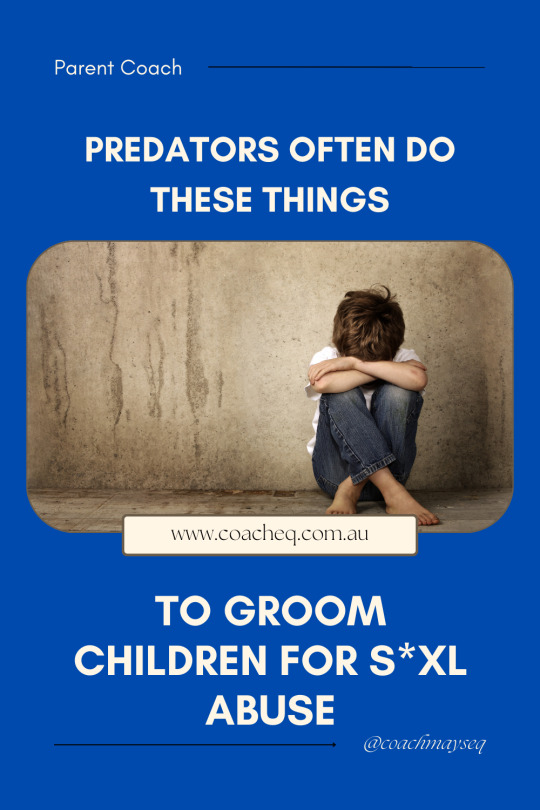
WHAT IS GROOMING?
Grooming is what experts call the intentional actions and behaviors of someone who tries to gain access to children they want to molest or sexually abuse.
People often think that predators are old dishevelled, dirty looking men. But the truth is, groomers can be anyone. They don’t often pick their child victims at random, and they’re often not “strangers” which is why we need stop focusing on “stranger danger.”
But most child sexual abusers know and have some sort of relationship with their victims. Predators often try to groom children, adults, and even whole communities so they can:
📣Gain access to children they abuse.
📣 Hide their actions.
📣Decrease the risk they will be found out and stopped.
PREDATORY CHILD GROOMING STRATEGIES
Predators groom children to gain their trust and create situations and opportunities to abuse them. While grooming takes many forms, predators often follow a five-step process to groom children for sexual abuse:
1. Identifying vulnerable children.
2. Engaging in peer-like involvement.
3. Desensitizing the child to touch.
4. Isolating the child emotionally and physically.
5. Making the child feel responsible for the abuse.
Though most predators start with the first step (identifying vulnerable children), it’s important to know that from there, many predators take two or more of the steps at a time, take them out of order, or skip some completely. Some predators do little or no grooming at all before starting to touch or abuse their child victims.
SEE LINK IN MY BIO FOR FULL ARTICLE
Be sure to follow @consentparenting and @parentingsafechildren for more information 📣
0 notes
Text
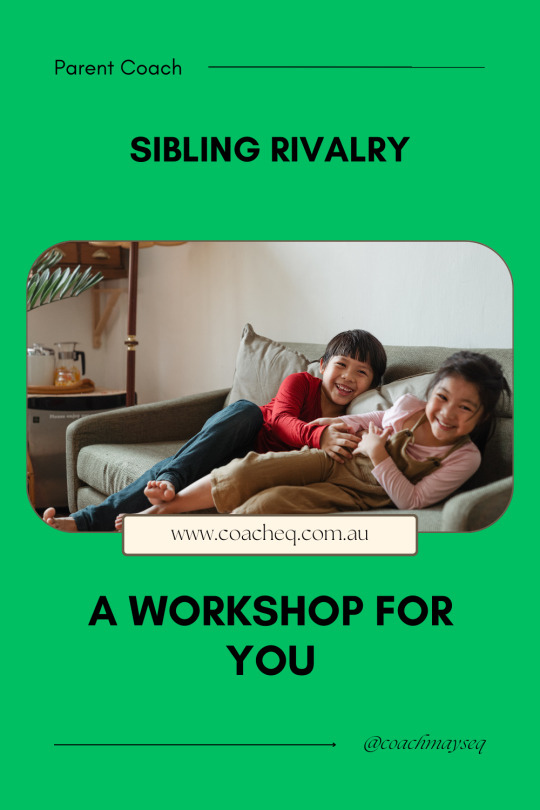
Siblings spend the MOST time with each other. If you’re tired of the bickering and squabbling, and you want to understand WHY the fighting is happening but ALSO want to learn HOW to stop it … then come along to my new workshop.
0 notes
Text
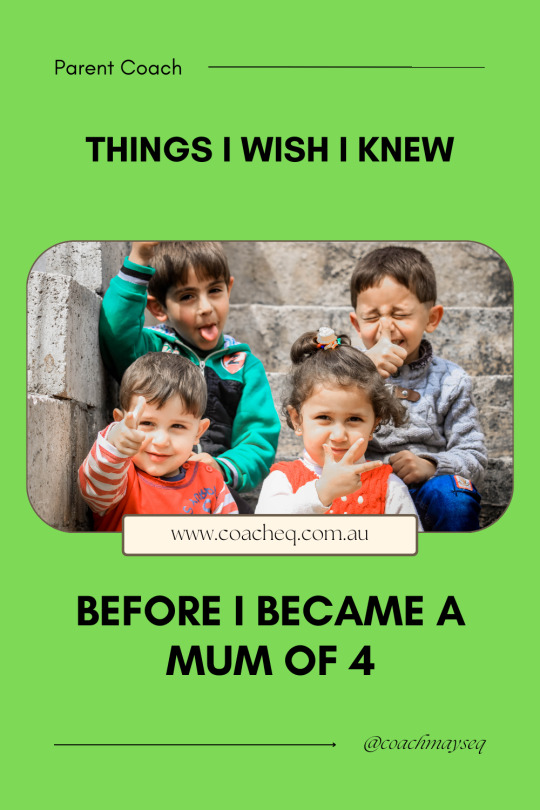
🗓️ I am running a workshop about building strong sibling relationship. DM me sibling for details
🔗There is ALWAYS more to the story behind a sibling fight, and a parent will often find themselves looking for who right and wrong. The key is to keep them safe and then help problem solve.
📍EXAMPLE: If 2 children are fighting over the same toy, then you need to step in and keep the environment safe. This might mean you hold the child back from hitting or remove the item or take a look at any dangerous choices being made. Then you need help them problem solve. Eg: how about a timer? how about i help? How about I hold this one? What do you think of this other toy?
⬇️⬇️⬇️⬇️⬇️⬇️⬇️⬇️
Elaine Mazlich and Adele Faber wrote a book called "how to talk so kids will listen & listen so kids will talk" and it is fascinating. Here are 5 Key Lessons From the book:
1. Understand the children’s needs. Respect their autonomy and nurture their self-esteem. Find out what the child really wants and needs and understand the situation from the child’s perspective.
2. Use information to guide behaviour. Effective parents use clear and specific language to guide their children’s behaviour. Frame instructions in the form of positive statements, rather than negative commands, to help create a positive learning environment.
3. Engage in the moment. Connect with your children and show them that you are genuinely interested in their ideas, feelings and struggles. Refrain from judging and punisihment when expressing your expectations.
4. Utilize problem-solving as a tool. When a child exhibits challenging bahaviour, use problem-solving as a tool to help them come up with their own solutions. It will help them become creative, independent thinkers and feel empowered.
5. Make time for meaningful conversations. Make time for meaningful conversations with your children. Talk about bigger issues and values, and show them that you are interested in their thoughts and feelings.
0 notes
Text
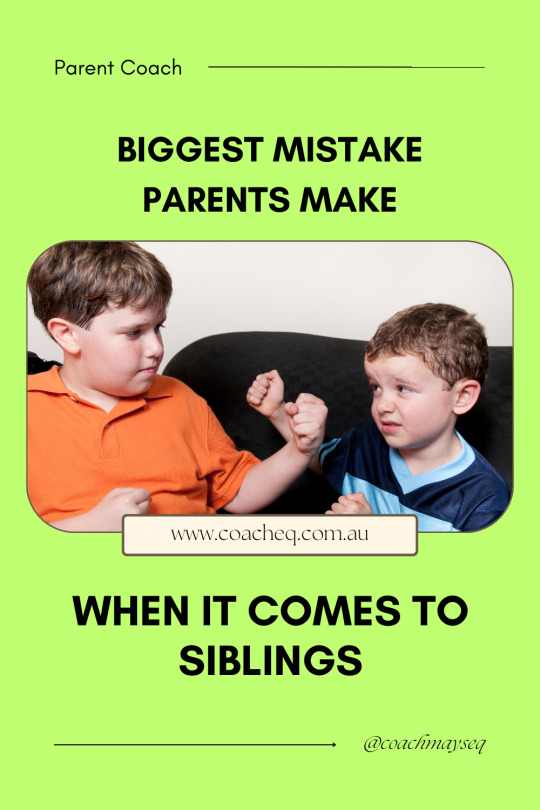
“All siblings will do some fighting, no matter what their parents do. Conflict is part of every human relationship, and you can’t stop your children from having needs and desires that sometimes clash. What you can do is give them healthy tools to work through those disagreements, tools they’ll use for the rest of their lives.”
From: Siblings Without Rivalry: How to Help Your Children Live Together So You Can Live Too by Adele Faber and Elaine Mazlish
In my upcoming sibling rivalry workshop, I’m going to be covering: factors that influence sibling rivalry strategies to manage the sibling rivalryHow to encourage, healthy, sibling relationships
ALSO: you will receive a comprehensive workbookI’ll be answering all your questions live and you will receive the recording which will be yours for a lifetime I’m also running a face-to-face workshop for those in Dubai. Can’t wait to help you cope with sibling rivalry.
0 notes
Text

So here are some more ideas for your little ones!
Just to be clear: here’s a reminder for you! Via Good Housekeeping.
“Screen time may get a bad rap, but savvy parents know it's not really the screens that matter — it's what kids are doing on them. When it's time to put on the TV, make the most of the downtime by making sure you're watching the best TV shows for kids out there — for both their sake and yours, since better shows will keep them engaged and entertained for longer, and will keep you saner, too.”
Add some more shows in the comments below, as thousands of parents are sharing!
0 notes
Text

This information from urbanchildinstitute.com:
💥💥
“When we think about optimal hearing and vision development in very young children, we are generally concerned with children not getting enough stimulation. We worry that children’s overall development might be delayed because of biological or environmental deficits. However, relatively new research tells that these concerns are not the only ones that place children at risk for developmental problems. We must also make sure that our children do not become over or inappropriately stimulated.”
What can parents do?
1. Limit the amount of TV young children watch.
2. Some children’s television programs are better than others.
3. Rather than watching TV to help your baby relax, sit close to your baby and talk softly to her.
4. TV isn’t all 'bad' and escaping screens is no longer a choice, but when we’re informed about how different types of screens and other stimuli affect our child’s brain, we’re empowered to see, and support our child instead of throwing up our hands at another 'tantrum”."
What other shows do you know that are non stimulating? Drop the names below!
0 notes
Text
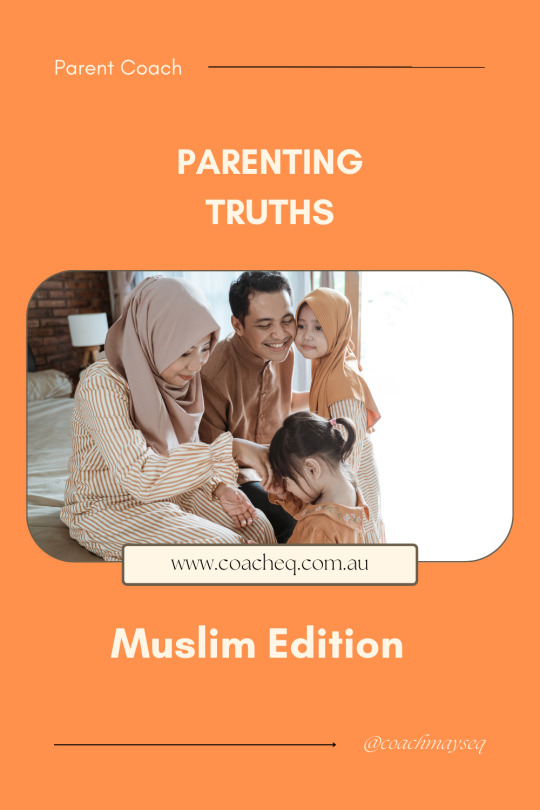
I get sooo many questions about what it means to practice conscious parenting and Islam. The thing is, it ties in together.
“Always keep in mind that you, the parent, will be asked about your child(ren). Ibn al Qayyim (rahimahullaah) says that the father will be asked about his child before the child is asked about his father. So for a parent to neglect teaching their child(ren) that which is beneficial is indeed a great wrong. Most children are corrupted due to their parents’ shortcomings in raising them well (and neglect in teaching them their religious responsibilities and duties).”
What would you add to these truths?⬇️
0 notes
Text

Things I’m still getting used to living in Dubai compared to back home (Melbourne).
A bit of light heartedness and also I get a bazillion questions about life here. Hope this sheds some light - remember ⚠️ NO city is perfect. There are pros and cons everywhere.
What question do you want to ask about Dubai?
0 notes
Text
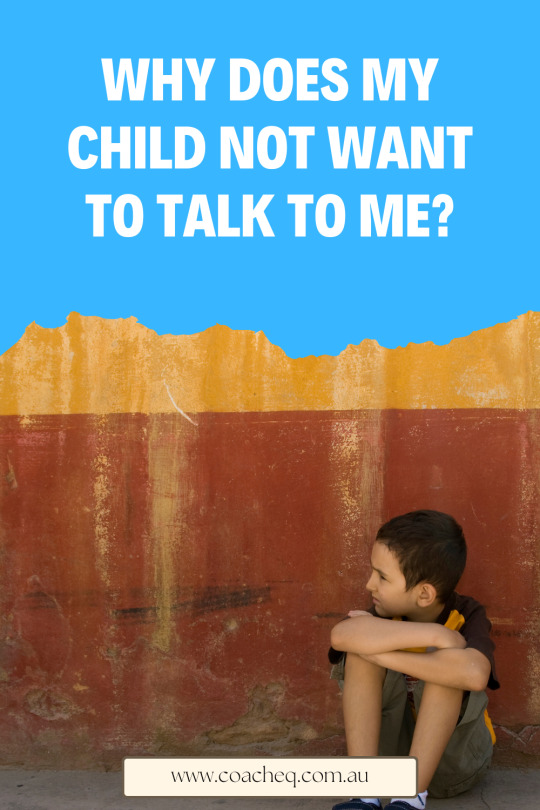
10/10 can recommend making cheese toasties and eating in front of the TV while watching your child’s favourite NBA game The best tip I can give you do you have a child that doesn’t listen is how often do you spend time with them without complaining or criticising or giving them any advice? How often do you do the thing that they like without an agenda?
The answer to these questions tells you a lot about whether your child is open to listening to you.
0 notes
Text
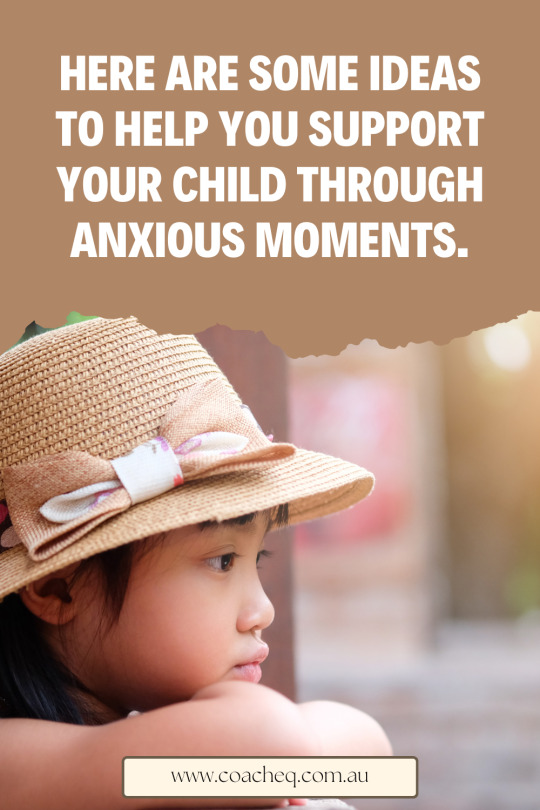
Understanding that you might be parenting your children today based on things you heard as a child is vital. We do it subconsciously.
Anyone else say something and suddenly “I JUST sounded like my mother!?!” Me! 🙋🏻♀️
You’re not weird or doing a bad job. Undoing patterns, breaking cycles and rewiring your brain with new language takes TIME & PRACTICE.
What are you changing in your parenting? Let’s inspire eachother! I’ll start first: I’m consistently reminding my children that their school marks do NOT reflect their worth.
Your turn 💕💥
0 notes
Text

Understanding that you might be parenting your children today based on things you heard as a child is vital. We do it subconsciously.
Anyone else say something and suddenly “I JUST sounded like my mother!?!” Me! 🙋🏻♀️
You’re not weird or doing a bad job. Undoing patterns, breaking cycles and rewiring your brain with new language takes TIME & PRACTICE.
What are you changing in your parenting? Let’s inspire eachother! I’ll start first: I’m consistently reminding my children that their school marks do NOT reflect their worth.
Your turn 💕💥
0 notes
Text
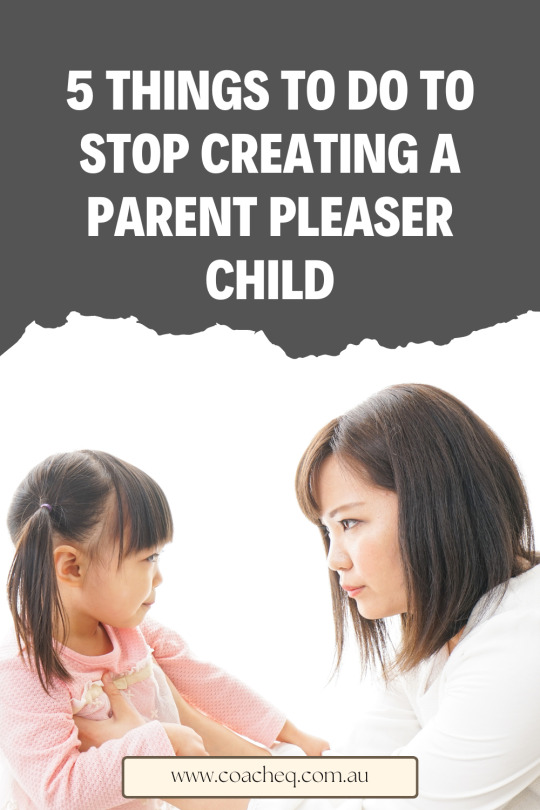
Being the good kid comes at a price and my number one tip for parents is to stop saying “you made mommy upset.”
When you tell a child that they made you feel a certain way then a parent pleaser child will start to think of ways to MAKE you feel happy and good. So they'll strive to continuously be the good kid.
You can instead express yourself by saying, “I am feeling upset because your shoes are not on and we're going to be late to school.”
People pleasing is a complex topic that far exceeds talking about it in a caption however it's so prevalent in nearly every family that I meet. It's so common because a lot of us are protecting ourselves by remaining “nice” and “empathetic” when in reality we probably are not comfortable to speak up for ourselves or want and need to be liked by others.
So how can we be liked if we might be feeling something that is intense?
In regards to your child, you can break the cycle by becoming aware and also giving them the freedom to speak their mind without your judgement or harshness.
What questions do you have below?
0 notes
Text
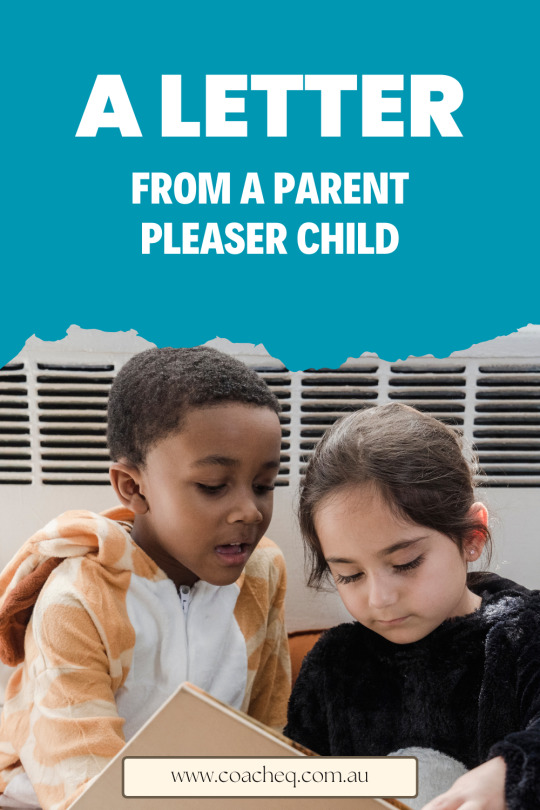
We often put aside the “good kids” and just call them sensitive. Easy going. Not ask much about their opinion.
We then groan when they’re indecisive or “too” nice.
We warn them to be wary of the big bad world but also want them to be low maintenance.
It’s just unfair.
Let’s start recognising the good kid as someone who ends up often becoming a people pleaser and then keeps their needs unmet.
0 notes
Text
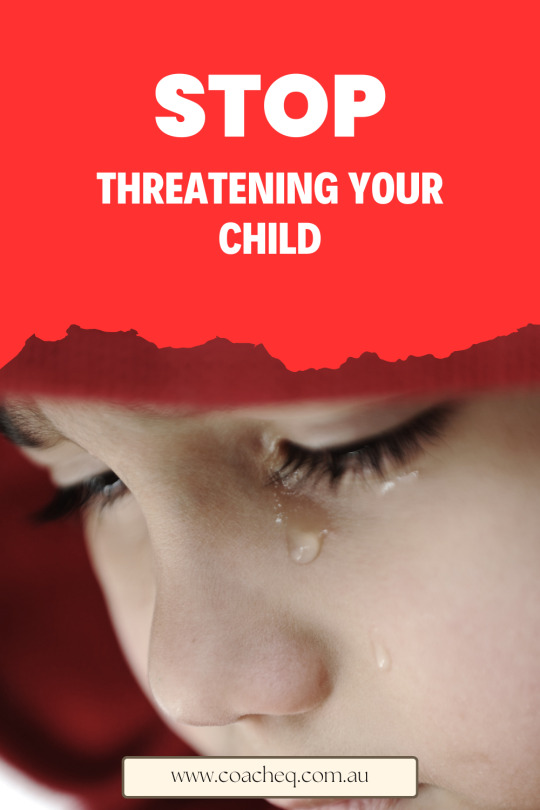
Tik Tok trends like pretending to call the police to get a child to stop misbehaving are never the solution. Scare tactics don’t work and aren’t effective in parenting. Building trust, open communication and understanding are the keys to positive parenting.
What questions do you have?
0 notes
Text

Everybody is born with a certain temperament, and some people are born gentler, kinder, and find it easy to empathise.
💫How on Earth did society decide that these kind of people are weak?
0 notes
Text

Check out this infomation:
“I recently asked this hypothetical question to a class:
You can have straight A’s but not learn a thing or you can have straight C’s but you learn and know more than anyone else in your class?
Can you guess what the kids picked? Grades.
But not because of why you might think. Most of them said they would rather learn, but that their parents would basically disown them for their bad grades, or they wouldn’t get into their “dream college.”
And that is why I say grades don’t matter, because a letter is not indicative of my self-worth, or anyone else’s for that matter. I will also add college is a business – so you will find a home, don’t worry.
Let’s be honest… how much emphasis do you put on grades in your home?
Children inevitably tie their worth to the number they’re given, and we want to indicate that self esteem is much more than a grade.
FYI, all 4 of my children go to a traditional (VERY british) school 🏫 and although my skin crawls, I support my kids the best way I know how. By showing them that I care more about character than an award or mark.
Sometimes… a part of me starts getting fired up… I have one child who never ever gets “pupil of the week award”. Never. I start to wonder why, and how I can fix this and why is my child not getting it.
And then I remember how I grew up thinking an award is how I earned respect and love. I don’t want that for my kid.
So I’ll say “I don’t really care for a piece of paper, do you?” And they say “nope” and then that’s it.
It’s not easy, I know. What are your thoughts?
0 notes
Text
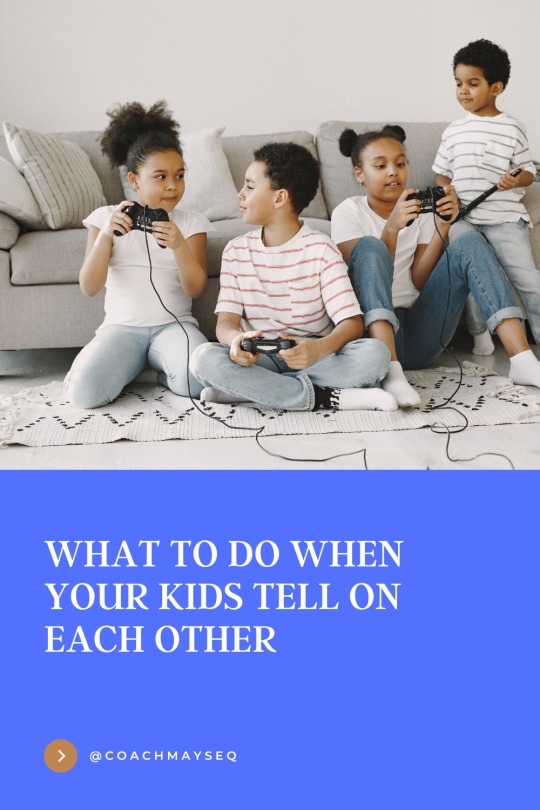
Dobbing aka “tattling” aka “snitching”… Let’s reframe our minds on dobbing and it actually means. Dobbing gets tiring when the parent pays huge energy & attention to how tiring it is. Listen to what the child is telling you & either send them on their way or problem solve. I hope this video helps you!
0 notes